10 days of no talking, no body language, no food after midday. All you have is you, your mind and your body sitting on the floor 10 hours a day trying to find sensation.
Do you know sensation?
It can be dry, wet, tickling, vibration, it can be anything. Vipassana is all about the present. The mind always wants to be in the past or future, never in the present. So in this technique one is trying to focus the mind in the present, trying to observe the sensations arising and passing on your body. Only observing, not reacting, not liking or disliking. Nothing is permanent. There is no imagination involved, vipassana means seeing things as they really are.
Do not kill, do not talk.
During the 10 days all distractions are minimized so one can fully focus on keeping the mind in the present and obeying to the 5 key rules:
- Noble Silence to make it easier to abstain from telling lies
- Full celibacy to abstain from all sexual activity
- No alcohol and drugs to abstain from all intoxicants
- Food is only vegetarian to abstain from killing, and if a mosquito is nibbling on you, let it
- Abstain from stealing
Men and women are fully separated, with separate dining rooms and areas on “campus”. You always have your own seat both in the dining hall and meditation hall. Literally your name is on that spot. Everyone is ordered always old students in front and new students at the back, both ordered by age. Exercise is not allowed, even yoga, so we only had a max 200m stretch we could walk up and down every day.
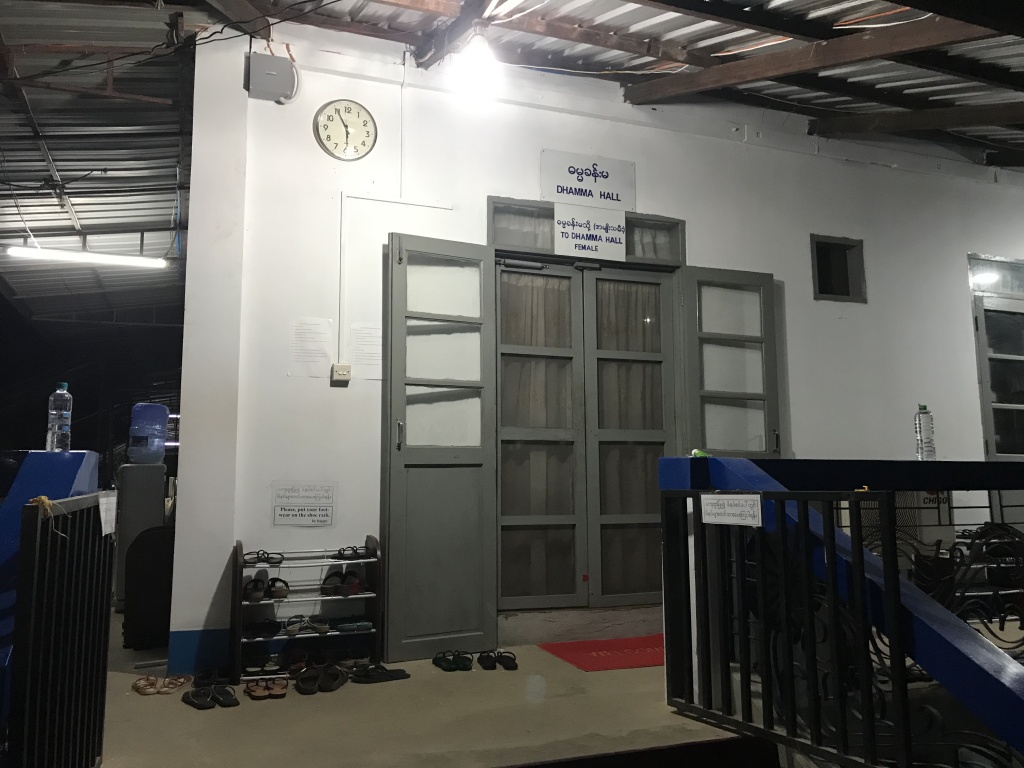
Female entrance to the meditation hall 
This is what the scene looked like for the 10h of meditation a day 
My spot, named. 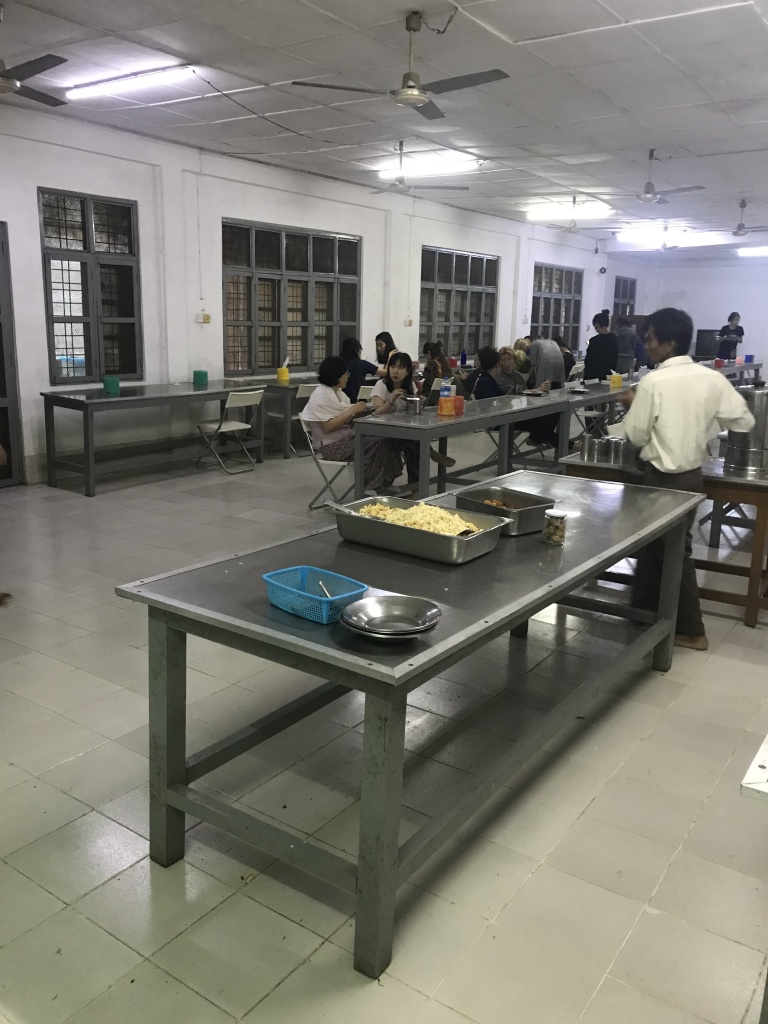
Female dining hall 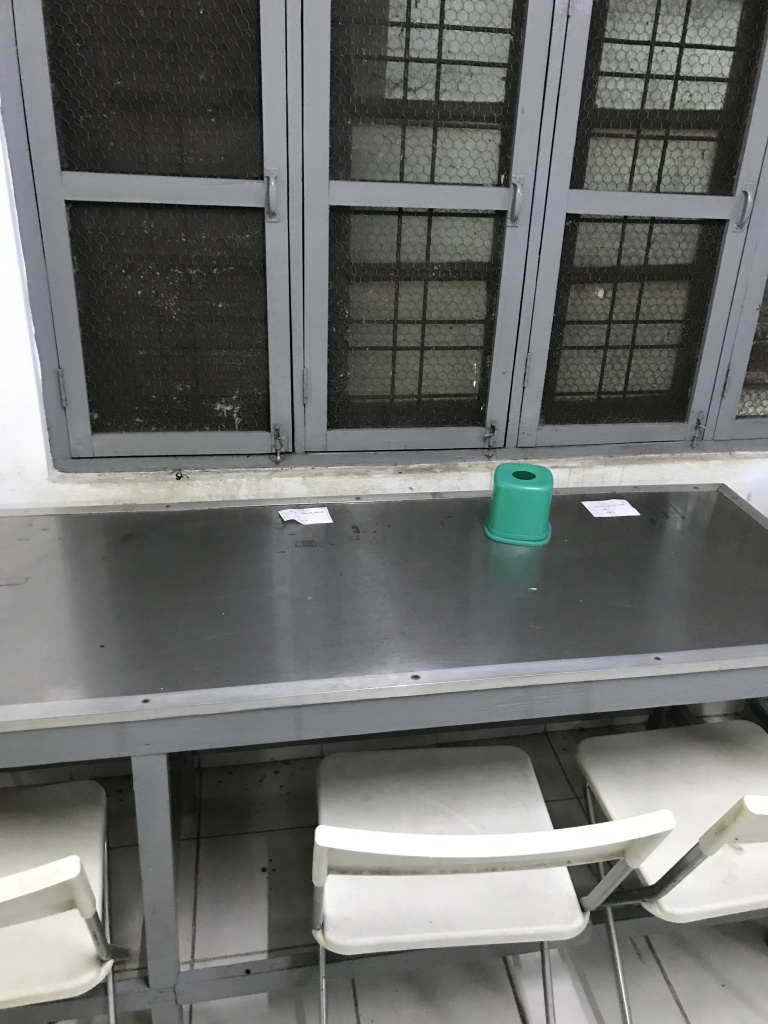
My seat at the dining hall, had a dead cockroach by my feet the whole time 
Our chill area, observing the trees 
Walking path, the little hill was great to feel out of breath just a little 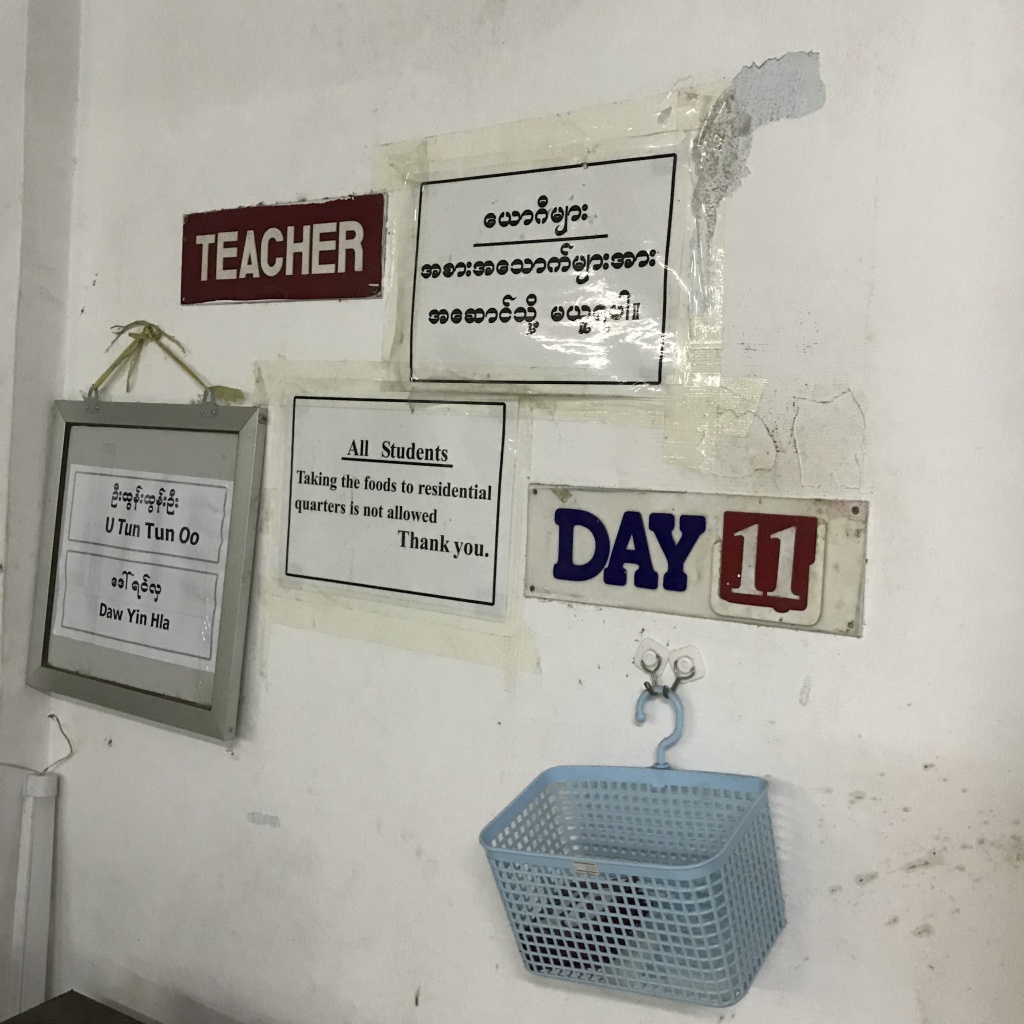
So that we know what day it is they were counted on the dining hall wall. Main teacher was called U Tun Tun Oo.
Schedule is followed strictly and everyone is a gong-zombie. The gong rings multiple times before every session and everyone moves towards the meditation hall, avoiding contact and keeping personal space. I’m surprised we didn’t oversleep any of the early morning sessions. The first 5 mornings they came with a small bell in front of the doors, but then they stopped, I guess the mind was supposed to get alert enough in 5 days. So there were some close calls.
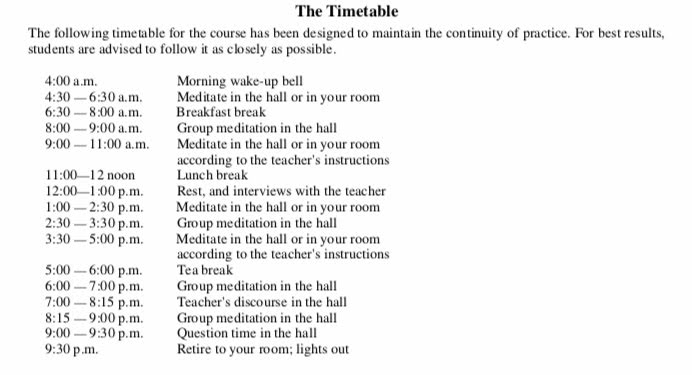
Expectations make us miserable
Buddhists believe that life is miserable. That the world is a miserable place and that we all came here to be enlightened through the practice of meditation Buddha used to become enlightened. What makes us miserable is having expectations (when they are not met), greed and craving for the good feelings. When we react to something negatively then the whole universe around us becomes negative and we again become more miserable. It’s all about ME and MINE. I related this to a very simple example: When I have to wait for V somewhere I get agitated because I have to wait and I expect him to be on time. But he actually needs the time (it’s not like he’s just chilling to make me pissed off), and when he finally comes and sees me angry he also gets upset and the whole atmosphere is more negative. So it’s better not to have an expectation and not to react to (some) things so strongly.
I went in to the course being mostly interested in the physical challenge and how it would affect me not having to talk for an extended period of time. The latter I was a bit afraid that it sounds better than it is, but it was magnificent. You get a roomie that you can talk to for a couple of hours at check-in, but whom you don’t know at all. And it all works out just fine without having to say or gesture anything. No unnecessary ‘should I turn off the lights?’, ‘would you like to use the bathroom before I shower?’ Etc. Of course it helps to be on a strict schedule.
For the knees it was a lot worse than expected. And my core is very weak. I love sitting on the floor, but 10 hours a day, trying not to move at all, that is a killer. That was a place where I refused to compromise – stabbing pain in the knee, release the position.
My other expectation was that having no food after midday will be the biggest challenge, but that turned out to be easy. Proper hunger only kicked in on day 9, because I realized that my bloated tummy is just fatness not a medical issue and decided not to stuff myself at lunch from day 5.
Live Dhamma – a fully compassionate, equanimous life
I didn’t expect much spiritually. Of course I had read that meditation is good for you, but do we have to believe everything we hear? In the end, when someone repeats into your ear all day for 10 days: “A calm and patient mind, perfect equanimity” it actually has some effect. I could write a horror movie from the thoughts and crazy deaths that crossed my mind. But having me-time taken to a new level (no books, no writing) you manage to analyse a lot – all kinds of things from the past and plans for the future. As I understand then the blind spots (places where you can’t find sensation) are connected to something negative you are holding on to, so you’re supposed to dig up the sensation and break it into pieces so it’s not so strong and deal with it, let it pass. Baseline of my compassion level was low, but I think it increased quite a bit. Goenka gave the example of someone sneezing next to you, and you think OMG how does she dare spread the bacteria on everyone here. I recognized myself immediately. You are supposed to be compassionate instead, oh poor woman she’s sick. I realised that I can’t be angry at other people for being unhappy and less lucky, just because I am lucky to be happy and fortunate to have honest relationships. I managed to dig up some shit and be my own psychologist and deal with these issues.
10 days, one day at a time
The one rule I broke was to keep short notes. Keeping notes was not allowed, but this was too interesting not to be recorded.
Everyone is different, so this is what I experienced. When comparing with others on the last day when we were given our voices back I realised I was aligned with some and completely different with others.
Day 0:
Checked in, gave away all my valuables and made my bed. They gave me a pink blanket and a green sheet and pillow case. My favourite colours pink and green. This is a good sign. Met my roommate Inji, from South Korea, cool chick. Spoke briefly to others before Noble Silence kicked in.
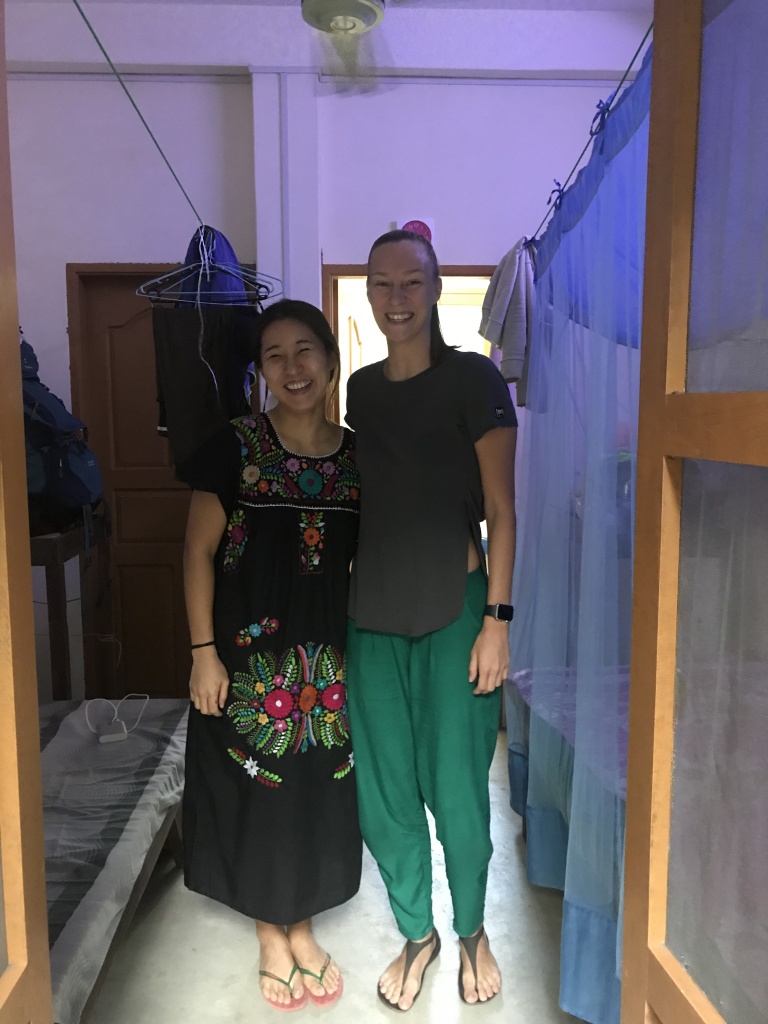
My roomie Inji 
My pink and green sheets 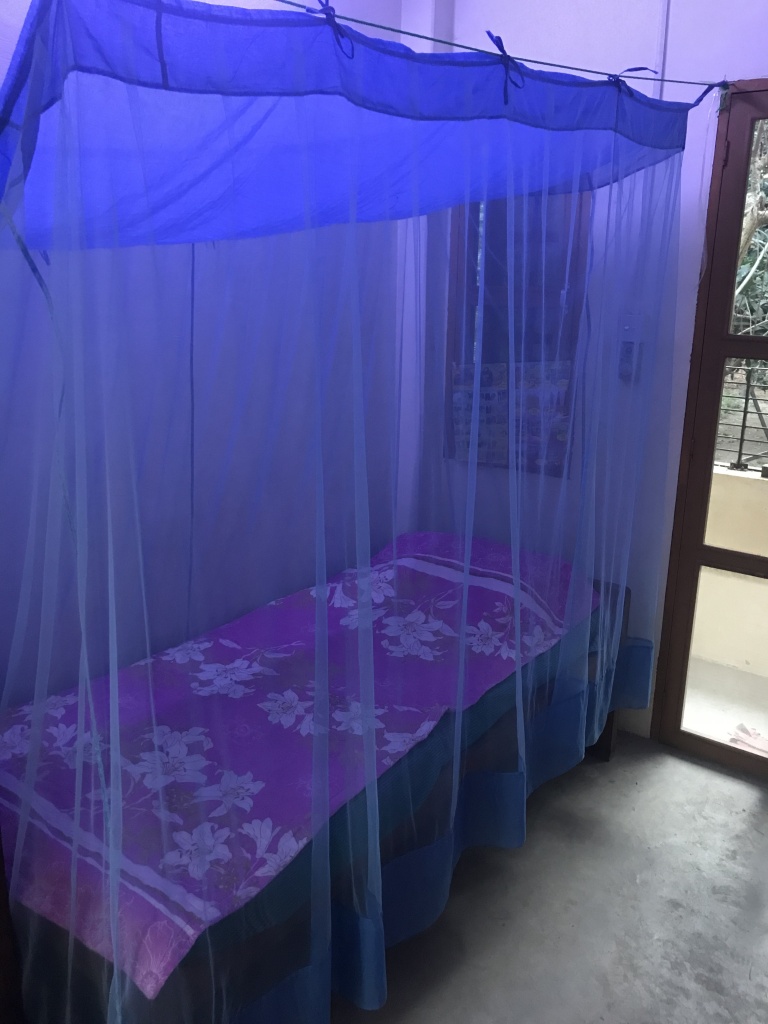
My princess bed 
Our room, view to the outside 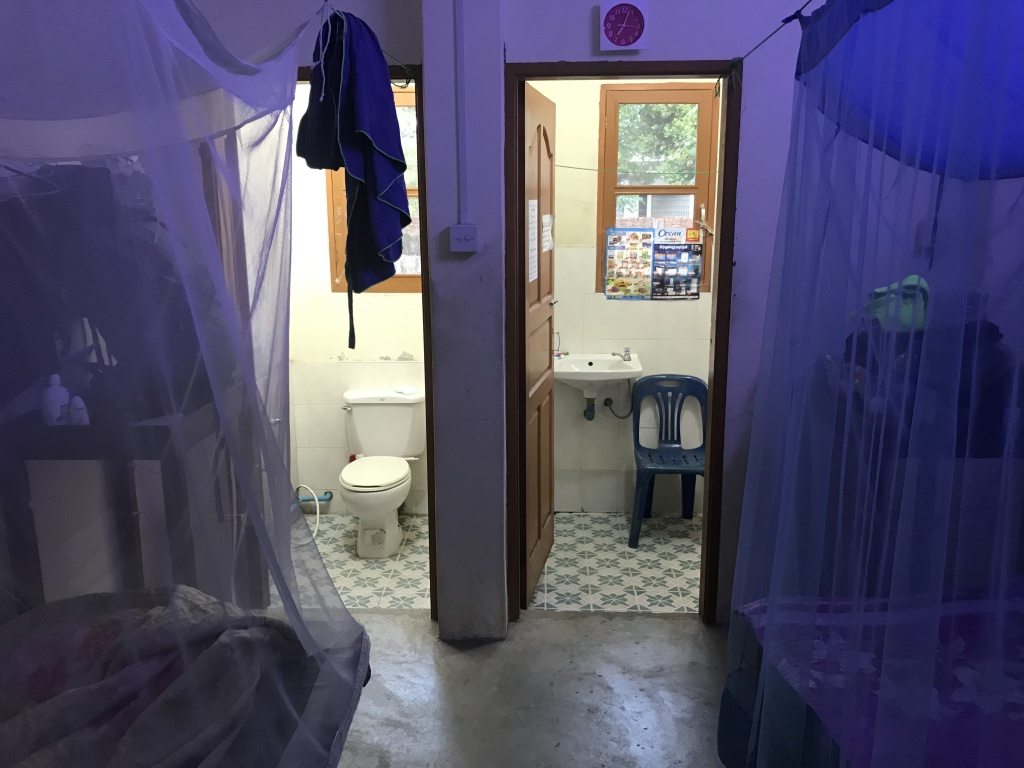
Our room, ensuite toilet and bathroom
Day 1:
Focus on the nostrils. Sitting on the floor and directing all my attention on the nostrils, nose and the area below the nose and above the upper lip. Is this what I signed up for? My mind it jumping through all kinds of thoughts, very enjoyable and happy. The man they play on the tape sounds like a drunk man singing, someone who doesn’t know the lyrics but insists on continuing. Joint pain in ankles, knees and hips. At 7pm we had teachers discourse that turned out to be a movie hour watching Goenka talk. He actually knows what we are going through. This will be my favourite hour. No hunger.

Day 2:
Back and ass pain join the row of joint pains. This is so boring. I really feel the Buddhist lifestyle of ‘Life is suffering’. During the movie hour Goenka goes on about how this is not a sekt, but yet how Dhamma follower should not drink, be a vegetarian (not to encourage killing) etc. A bit demotivating, excitement about the daily movie hour disappeared.
Day 3:
Looking for a sensation. Found them! This gave me new motivation. Morning was difficult (nerve pain), but evening was ok.
Day 4:
Be one with moustache. Area got narrowed down to just the one below the nose and above the upper lip. Such a small area to sharpen the mind. Then preparation ended and Vipassana was introduced – looking for the sensation from head to toes, scanning all the way. All the joints have started cracking. Neck and back are numb. If given a get out of jail free card I would probably take it.
Day 5:
Super horny today. Visions of 2somes, 3somes and 4somes. It seems my subconcious is an excellent porn director. Sat for 1h not moving during the hour of strong dedication. Wow! It’s all about impermanence: arising and passing, no like/dislike. A sign was put up saying you’re not supposed to move your hands or legs or open your eyes during the 3x1h strong dedication sessions, but remember that you are here not to torture yourself. 😂 Live jukebox in my head – I really need to learn lyrics for full songs.
Day 6:
Morning 4:30-6:30 meditation is a killer. You are looking forward to food, and brain is not wired enough to focus on meditation for even a second. Sat 1h not moving again. There are birds screaming outside, so I imagined they are seagulls on a beach and imagined myself to eating ice cream on the beach. So nice, what a happyplace!
Some confusion about the technique – e.g. is free-flow the goal? Questions unanswered as the teachers speak no English. They know how to repeat the things on tape and posters, but do not understand your questions.
I’ve realised I’m a great entertainer to myself – 6 full days of fun. Everything is sensational! I moved from scanning from head to toe to observing random sensations popping up all over the body (apparently wasn’t the next step in the technique). ‘Hello, sensation. Welcome. Thank you for coming, goodbye!.’
Day 7:
Actually had a good morning 4:30-6:30 today, worked on my posture that is improving. Finally there was watermelon as fruit at breakfast (we’ve had papaya, apple, bananas,..), so I pigged out until I couldn’t breathe.
We got allocated pagoda cells today and I magically got my lucky number 23. We moved to parallel scanning, instead of right arm and then left arm you observe them together. Got some good scanning done in the cell. But then looked at myself from a thirst person perspective: In a dark cell, on a floor in a weird position trying to freeflow a sensation through the body – sort of like looking for the orgasm from a drug and got a bit depressed. Started craving for some external entertainment. Have I had enough?
We expect things to happen and when they don’t we are miserable – the craving and greed is making us miserable.
Day 8:
My flame has gotten very small. Depression coming? I now understand why they ask if you’ve had depression or mental illness on the application form.
No new exercises, just repeat the same. Work on the blind spots. Difficult day.
Strong sensation went through the body in the evening. And managed to pulse a sensation from head to toe when lying down on the bed. Wow! What a feeling. So why do we need to suffer sitting down when this is so much easier when lying straight on the bed.
Day 9:
No sensation the whole morning. Gone. Keeping eyes closed for the whole day is so exhausting, especially when trying to relax face muscles. Proper hunger kicked in this evening – stomach actually pulling and hurting, can’t sit very straight.
Day 10:
I had anxiety of having to talk again. How do you start a conversation, what do you say? But the silence broke laughing when after the special Metta Dhamma session the guy only said information in Burmese and left us foreigners clueless. I gave a short interview to the Myanmar TV about why I came and how I found the experience in the centre.
During the 10 days I got to know and observe a lot of things about the people, but avoiding eye contact I knew their bodies, style and hair well, but the face not so much. When we finally started talking I realised what cool people they all are.
They gave us our wallets back at 11 for donations and phones at 8 in the evening. Then all the dhamma went out of the window – it was all about my phone, my people.
Why Dhamma Joti centre in Yangon, Myanmar?
The technique started with Buddha, but got lost in between. So it was brought back to life in Myanmar (Burma) and continues to be practiced here the original way. The current “guru” is S. N. Goenka, whom we saw on the videos still teaching us during the 10 days, even though he passed away in 2013. I always thought vipassana is Indian, and initially wanted to take the course in India. But I was a bit late with applying, so courses were booked out or the timings didn’t align well with our travel plans. Then I found out that Myanmar is actually the birthplace and found a spot in Dhamma Joti. Although Goenka is born in Burma, his family/parents are Indian so I wasn’t completely off. We were ca 70 women, of whom ca 15 internationals, plus ca 20 men on the course. I believe doing it in Myanmar was a huge advantage compared to spending the 10 days in a centre in Europe where home is a short ride away. You see the dedicated locals, oldest was 97 years old, and some who have been to the course at least 11 times. We also had 4 monks and 2 nuns among us. Plus all the foreigners have travelled especially for this all the way, so are a bit more motivated to follow through with it.
The people all work on a voluntary basis and get no money for it. We were also encouraged on the last day to volunteer for at least 1 course a year. I very much enjoyed that the donations were mentioned, but very politely and not in a forcing way. I originally planned to do a transfer, but then it turned out that banks and Transferwise don’t transfer to Myanmar (on the list with other dodgy countries), so made a special trip to give cash after we toured Myanmar and were back in Yangon. I believe it’s fair to at least cover the food and accommodation cost, but the amount is individual to decide and no guidelines are given. You are more encouraged to meditate 2h every day and do a 10-day course once a year to keep up the practice. Will I do it again? I don’t yet know: For my mind and soul it would be great, but my knees are already bad and this is a crazy torture for them.
All in all
I am very happy I did the 10-days course. It gave me motivation to get my flexibility back and to get a strong core again. I never expected to meet such cool people and get the contacts, but the girls were all so different, each with their own story, and so amazing. I also discovered I spoke only English in my head for the 10 days. Tried to recall some Estonian songs during my jukebox session, but that didn’t work out very well either. I believe I’m a bit calmer, reacting less to pointless things. I hope the latter effect will last and keep the whole universe around me more positive. I also hope that I can handle heat and sweat better – it’s just a sensation, impermanent one. It got pretty hot in the meditation hall in the afternoons so the sensation got practiced a lot, I also found it a bit easier as the water seemed to transmit the sensation better and made free-flow practice easier.


Happy we succeeded, with Inji and Lyn 
Time to say goodbye and continue meditating elsewhere 
Met up with girls to have tasty lunch and eat our calories back at Dunkin’ Donuts. With V, Yichu and Inji
Here’s a glimpse of Goenka talking (he grew on me, and is actually pretty funny sometimes):
If you want to listen to all the 10 day discourses, they can be found here: